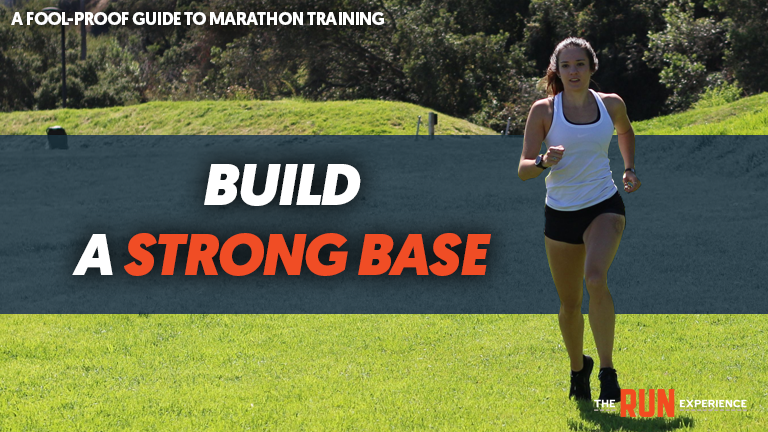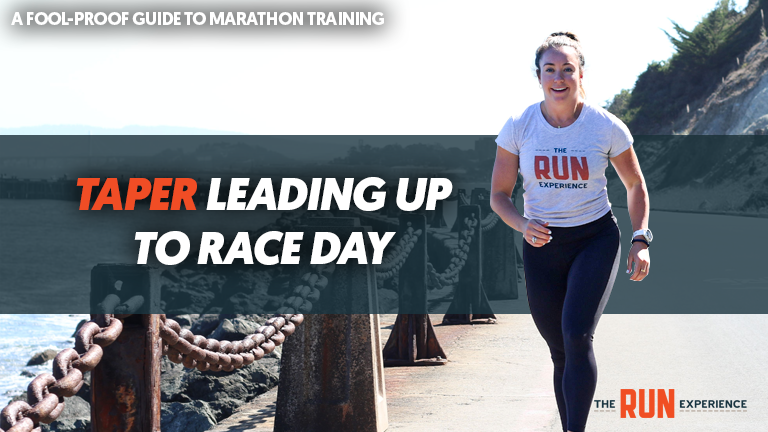How to Train for a Marathon from Scratch (the Right Way)
Learn how to train for a marathon from scratch, whether you've been running low mileage for years or are coming straight off the couch.

Want to learn how to train for a marathon from scratch?
So, you’ve become an avid runner and you’re ready to take on a marathon. Perhaps you’ve worked your way through some 5ks, 10ks, and even a half marathon or two. Now you’re ready to take on the big 26.2. But, you might not know where to start with marathon training.
That’s where we come in.
At the Run Experience, we have training plans that will help first-time marathoners feel confident and ready to cross the finish line strong on race day. Below, we'll walk you through everything you need to know to train for a marathon from scratch with complete confidence.
How to Train for a Marathon From Scratch
First things first. Before you embark on a marathon training plan, make sure you can run at least 30-45 minutes without stopping. If you haven’t gotten to this point yet, start with one of our other programs, such as the 30-Day Challenge to get you up to speed.

Once you’re ready, plan for your marathon training program to take about 16 weeks. In this article, we’ll outline what to expect along the way as you prepare for an epic race.
Marathon Training Gear
First things first. Like any sport, you need the right gear and equipment for training for your first marathon. Of course, you’ll need a solid pair of training shoes. This is one place you don’t want to skimp. If there is any place to splurge, it’s on shoes–your feet will be getting a lot of impact during your training program.
Check out this video to learn more about how to find the perfect pair of running shoes:
Depending on the weather, you also need to consider what kind of clothing you will need. Always go for sweat-wicking socks to prevent blisters. In warm weather (I say above 50F or so), shorts are fine–remember, you are going to warm up. It’s up to your preference. You can also consider leggings, sweat-wicking long and short sleeve shirts, and sunglasses to protect your eyes and avoid glare on sunny days. In colder weather, layer up! As you heat up, you might want to lose the gloves, hat, or jacket.
Marathon Training From Scratch Outline
Before you settle into a training plan, you need to determine your optimal marathon pace. Do a 30-minute threshold test so see what pace you can hold for 30 minutes. Your goal mile pace should be slightly slower than this pace. However, as you train, you’ll probably get faster, so feel free to do another threshold run a few weeks out from the race! You can also try using your half-marathon race pace if you’ve run one before, but slow it down by about a minute. Finally, you can use the average pace of your longest run as another option.
Here’s what an average week will look like. As the weeks go on, you’ll add some distance to each week based on your preference and comfort level until you get to the tapering phase–but we’ll get to that later.
Monday: Core Work & Restoration–think bodyweight work, mobility drills, and core training
Tuesday: Drill Run–incorporate drills into your run to get faster and stronger
Wednesday: Strength and Cross-Training– do some strength work, either bodyweight or with added weight. Cardiovascular work like the elliptical, swimming, or biking can get your heart rate up while easing the pounding on your legs

Thursday: Tempo Run–speedwork builds up your body’s ability to run faster for longer periods of time
Friday: Rest day, Nutrition & Mobility: Focus on getting some rest, healthy eating, recuperating, and stretching to get you ready for your long run
Saturday: Long Run– This run should be long and steady, starting at about 5-7 miles and going up 20 miles by the end of your program. Add a few miles per week with regular recovery weeks
Sunday: Fun Run– Marathon training can feel like serious business. Take this day to have fun with your running. Go on a low-key conversational run with a friend or hit up your favorite trail. Just keep it light and allow yourself to recover from your long run.
Prioritize the Long Run
Ok, so let’s zero in on the long run for a bit. It’s a critical part of your marathon training because it gets you ready to go the distance on race day. Tempo runs and intervals certainly help with your speed, but long runs give you the most endurance and get you confident that you can run the full 26.2 miles without hitting the wall.
About four weeks before the race, you’ll want to build up your long run to work up to 20-22 miles. It may seem daunting, but if you’ve been building your long run up two to three miles every week, it should be manageable. Plus, it gives you the opportunity to practice marathon pacing, hydration, and what kind of nutrition you might need during a long run like gels, bars, gummies, or sports drinks.
Make sure to plan your route before you go on a long run. Use an app like Google Maps or a GPS route so you know you don’t get off course. It’s not a good idea to hop out the door and say, “Here I go for a 20-miler” and amble off without a plan. Now, check out this video about long runs to learn more!
How to Taper Before the Marathon
Once you’re two weeks away from race day, it’s time to taper. The most difficult training is behind you, and now you need to keep your fitness but still feel rested enough for race day. If you taper just right, you’ll feel unbelievably confident and light on your feet at the starting line.

Here’s how to do it (and why):
- Two weeks before the race, decrease your mileage by about 20-25 percent to lessen the stress on your body while keeping your stamina and strength
- Keep one speed workout per week to maintain quick foot turnover
- Decrease your long runs to 10-13 miles
- Allow for extra recovery time and stretching
Training tip: Some runners have a hard time with tapering because they feel like they are “losing their edge” and have to train full throttle until race day. It’s not true. Your body needs some extra recovery to give you an extra spring in your step before the race. Besides, you won’t make any significant gains in the last two weeks of training.
Check out this video for three low volume tapering marathon tapering ideas!
Marathon Race Day Tips
You’re bound to be a little nervous pre-race day–it’s normal! Get a regular night’s sleep, not too little and not too much. Before bed, make a list of the things you need to pack in the morning (or the night before) such as:
- Shorts
- Top
- Race bib
- Layers for weather
- Socks
- Hat
- Shoes
- Watch
- Sunscreen
- Anti-chafing balm
- Sunglasses
- Energy bars, gel, and sports drinks
- Change of clothes for after the race
- Water bottle
- Flip flops–you’ll want to get out of those shoes
- Baby wipes or post-workout wipes–you’ll be salty!
- Towel
Wake up at least three hours before the race and have a good breakfast with easily digestible carbs and proteins at least two hours before the race. Listen to some motivating music on the way, meditate, or talk to a friend or family member. You’ve put the work in, so you’ve got this!
Tips for Marathon Training from Scratch
Whether you're new to running or coming back after a break, the idea of building up to 26.2 miles requires physical endurance and mental perseverance. Here are some tips to help you get your marathon training from scratch right:
- Set Realistic Goals: Begin by setting achievable goals based on your current fitness level. Be realistic about your pace, distances, and recovery times to avoid burnout and injuries.
- Gradually Increase Mileage: Avoid the temptation to increase your mileage too quickly. A good rule of thumb is the "10% rule," which suggests not increasing your weekly mileage by more than 10% from week to week.
- Incorporate Variety in Training: Your marathon training should include a mix of long runs, speed workouts, and recovery runs.
- Focus on Nutrition and Hydration: Proper nutrition and hydration are crucial for successful marathon training. Focus on a balanced diet rich in carbohydrates, proteins, and fats.
- Listen to Your Body: Pay close attention to what your body tells you. If you feel overly fatigued or experience pain, it may be a sign to cut back or rest.
- Strength Training and Cross-Training: Incorporate strength training and cross-training into your routine to improve your overall fitness and reduce the risk of injury.
- Schedule Rest Days: Rest is just as important as training. Have at least one complete rest day per week to allow your muscles to recover and rebuild.
- Long Runs are Key: Your long runs are the most important part of marathon training as they build the endurance you'll need for race day. Gradually extend the length of your long runs, and try to simulate the conditions of your upcoming marathon as much as possible.
- Mental Preparation: Marathon running is as much a mental challenge as it is a physical one. Develop strategies to cope with discomfort and fatigue during long runs. Visualization, positive self-talk, and setting mini-goals can be effective techniques.
Start Your Marathon Training from Scratch
You’ve got to start somewhere, so don’t be afraid to start training for a marathon from scratch. At one point or another, we’ve all been there.
Now that you have a marathon training plan, don’t forget to download our new mobile app for access to coaching advice, daily video workouts, injury prevention tips, and complete training programs that will help motivate and inspire your training program!
